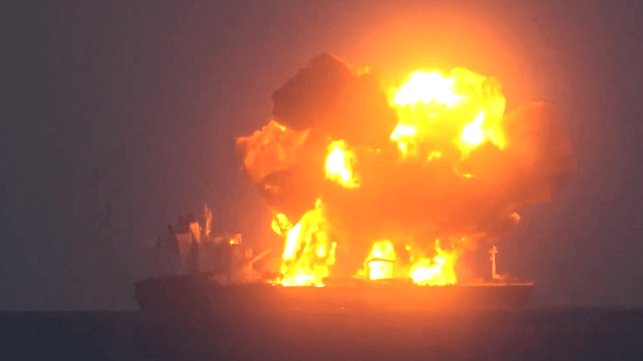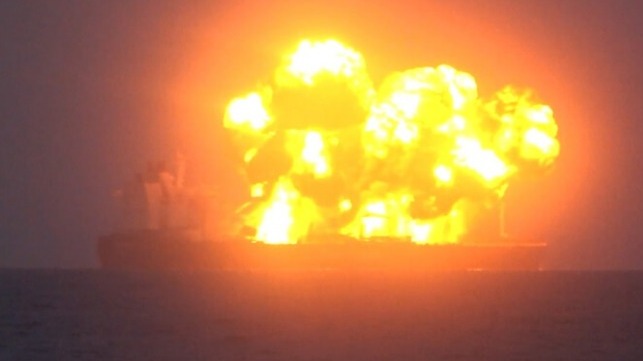WAR IS ECOCIDE
Burning Tanker in Red Sea Threatens Disaster Worse Than Exxon Valdez

Two days after Houthi forces blew up the cargo tanks of the Greek-owned Suezmax Sounion, the flames emerging from the vessel's deck were still visible from space, based on imagery from the EU's Sentinel satellite system. Western governments have warned that the terrorist group's action could cause a devastating oil spill in the Red Sea, up to four times larger than the Exxon Valdez disaster - with serious consequences for the environment and for subsistence fisheries.
"While the crew has been evacuated, the Houthis appear determined to sink the ship and its cargo into the sea," said the U.S. State Department in a statement. "Through these attacks, the Houthis have made clear they are willing to destroy the fishing industry and regional ecosystems that Yemenis and other communities in the region rely on for their livelihoods, just as they have undermined the delivery of vital humanitarian aid to the region through their reckless attacks."
The European Union's naval mission in the Red Sea, EUNAVFOR Aspides, echoed these concerns.
"This situation underlines that these kinds of attacks pose not only a threat against the freedom of navigation but also to the lives of seafarers, the environment, and subsequently the life of all citizens living in that region," the EU mission said in a statement.
Before the blast, multiple Houthi observers aimed video cameras at the vessel from different angles. Based on their footage, the tanker was wracked by three simultaneous explosions, and three fireballs erupted from the main deck level upwards. The pattern suggests that after they disabled the Sounion, the Houthi attackers waited for Western defenders to leave, then boarded the tanker, placed explosive charges on deck, and recorded the ensuing detonation for public release - as they have done previously.
A spokesman for Houthi forces did not address potential environmental harm from the attack, and said only that the vessel was targeted because of the shipowner's alleged decision to continue sending vessels to Israeli seaports. The Houthi militia has declared a naval blockade on Israeli-affiliated shipping because of the ongoing military operation in Gaza, though it has previously attacked vessels without any clear Israeli nexus - including vessels linked to Houthi allies.
Houthis Set Sounion Tanker Ablaze Causing Potential Environmental Disaster

The Houthis militants released video late on Friday showing explosions aboard the laden Greek tanker Sounion setting the stage for what experts believe will be one of the world’s worst environmental disasters.
The vessel is fully laden with approximately 150,000 tonnes (more than 900,000 barrels) of crude loaded in Iraq. Two years ago, UN officials warned that if the FSO Safer, which was also off the coast of Yemen, failed it would take 25 years for fish stocks to recover while the cost of cleanup alone would be a staggering $20 billion. The FSO Safer had about one million barrels aboard.
The UK Maritime Trade Operations earlier today issued an update saying it had been told that it appears there are three fires burning on the vessel. In addition, earlier reports had said the ship had dropped its anchors and that Delta Tankers was arranging for its salvage. UKMTO now cautions that the vessel appears to be drifting.
Yesterday, after the tanker was evacuated, EU officials had issued a statement calling for caution and urging everyone in the area to “refrain from any actions that could lead to a deterioration of the current situation.” The Houthis in the past have been known to board disabled vessels and renew their attacks.
The French frigate Chevalier Paul defended the tanker yesterday from a further attack by the Houthi while also coordinating the evacuation of the 29 crewmembers. When they left the vessel, the report said the fires had been extinguished, but that the vessel had taken on water. It was without power.
The crew of the tanker, which included a Russian captain, 24 Filipino seafarers as well as three from India and one from Nepal, arrived in Djibouti at around 2200 last night according to the port authority. They said all the crew were safe and being attended to following a similar report from the authorities in the Philippines. Reports said one crewmember received minor injuries.
Officials in Djibouti had issued an urgent call for immediate intervention by the Regional Organization for the Conservation of the Environment of the Red Sea and Gulf of Aden. They were urging that actions be taken to mitigate the impact of the attack and protect the marine environment.
UN officials two years ago warned of the consequences of a large oil spill in the region. They had said if the FSO Safer failed the large spill would be an environmental and humanitarian catastrophe. They predicted the destruction would reach pristine reefs, coastal mangroves, and other sea life across the Red Sea, exposing millions of people to the pollution and cutting off food, fuel, and other life-saving supplies. Coastal communities the UN emphasized would be hit hardest with hundreds of thousands of jobs in the fishing industry being lost. A spill from the Sounion would be on the same magnitude as the FSO Safer.
No comments:
Post a Comment